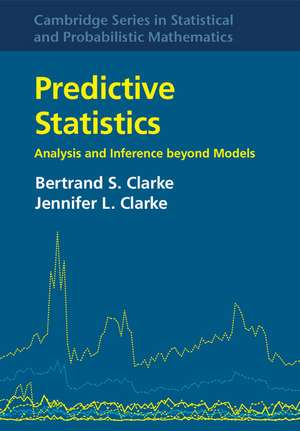Predictive Statistics: Analysis and Inference beyond Models: Cambridge Series in Statistical and Probabilistic Mathematics, cartea 46
Autor Bertrand S. Clarke, Jennifer L. Clarkeen Limba Engleză Hardback – 11 apr 2018
Din seria Cambridge Series in Statistical and Probabilistic Mathematics
- 20%
 Preț: 282.30 lei
Preț: 282.30 lei - 8%
 Preț: 393.37 lei
Preț: 393.37 lei -
 Preț: 273.60 lei
Preț: 273.60 lei -
 Preț: 310.95 lei
Preț: 310.95 lei - 11%
 Preț: 522.34 lei
Preț: 522.34 lei - 8%
 Preț: 420.35 lei
Preț: 420.35 lei - 11%
 Preț: 669.91 lei
Preț: 669.91 lei - 8%
 Preț: 467.64 lei
Preț: 467.64 lei - 20%
 Preț: 466.18 lei
Preț: 466.18 lei - 11%
 Preț: 710.86 lei
Preț: 710.86 lei -
 Preț: 455.00 lei
Preț: 455.00 lei -
 Preț: 389.13 lei
Preț: 389.13 lei - 8%
 Preț: 500.69 lei
Preț: 500.69 lei -
 Preț: 472.57 lei
Preț: 472.57 lei - 11%
 Preț: 656.39 lei
Preț: 656.39 lei - 20%
 Preț: 688.50 lei
Preț: 688.50 lei - 11%
 Preț: 459.20 lei
Preț: 459.20 lei -
 Preț: 448.80 lei
Preț: 448.80 lei -
 Preț: 411.63 lei
Preț: 411.63 lei -
 Preț: 406.25 lei
Preț: 406.25 lei -
 Preț: 417.11 lei
Preț: 417.11 lei -
 Preț: 412.05 lei
Preț: 412.05 lei - 11%
 Preț: 460.56 lei
Preț: 460.56 lei -
 Preț: 316.34 lei
Preț: 316.34 lei -
 Preț: 463.48 lei
Preț: 463.48 lei - 14%
 Preț: 861.21 lei
Preț: 861.21 lei - 11%
 Preț: 591.23 lei
Preț: 591.23 lei - 11%
 Preț: 594.78 lei
Preț: 594.78 lei -
 Preț: 414.51 lei
Preț: 414.51 lei - 11%
 Preț: 462.29 lei
Preț: 462.29 lei - 11%
 Preț: 589.85 lei
Preț: 589.85 lei - 11%
 Preț: 584.70 lei
Preț: 584.70 lei - 11%
 Preț: 539.55 lei
Preț: 539.55 lei - 11%
 Preț: 436.85 lei
Preț: 436.85 lei - 11%
 Preț: 567.88 lei
Preț: 567.88 lei - 11%
 Preț: 546.83 lei
Preț: 546.83 lei - 11%
 Preț: 600.93 lei
Preț: 600.93 lei - 8%
 Preț: 384.68 lei
Preț: 384.68 lei - 11%
 Preț: 701.84 lei
Preț: 701.84 lei
Preț: 607.29 lei
Preț vechi: 682.34 lei
-11% Nou
Puncte Express: 911
Preț estimativ în valută:
116.24€ • 126.31$ • 97.71£
116.24€ • 126.31$ • 97.71£
Carte tipărită la comandă
Livrare economică 21 aprilie-05 mai
Preluare comenzi: 021 569.72.76
Specificații
ISBN-13: 9781107028289
ISBN-10: 1107028280
Pagini: 656
Dimensiuni: 180 x 259 x 40 mm
Greutate: 1.32 kg
Editura: Cambridge University Press
Colecția Cambridge University Press
Seria Cambridge Series in Statistical and Probabilistic Mathematics
Locul publicării:New York, United States
ISBN-10: 1107028280
Pagini: 656
Dimensiuni: 180 x 259 x 40 mm
Greutate: 1.32 kg
Editura: Cambridge University Press
Colecția Cambridge University Press
Seria Cambridge Series in Statistical and Probabilistic Mathematics
Locul publicării:New York, United States
Cuprins
Part I. The Predictive View: 1. Why prediction?; 2. Defining a predictive paradigm; 3. What about modeling?; 4. Models and predictors: a bickering couple; Part II. Established Settings for Prediction: 5. Time series; 6. Longitudinal data; 7. Survival analysis; 8. Nonparametric methods; 9. Model selection; Part III. Contemporary Prediction: 10. Blackbox techniques; 11. Ensemble methods; 12. The future of prediction; References; Index.
Recenzii
'Prediction, one of the most important practical applications of statistical analysis, has rarely been treated as anything more than an afterthought in most formal treatments of statistical inference. This important book aims to counter this neglect by a wholehearted emphasis on prediction as the primary purpose of the analysis. The authors cut a broad swathe through the statistical landscape, conducting thorough analyses of numerous traditional, recent, and novel techniques, to show how these are illuminated by taking the predictive perspective.' Philip Dawid, University of Cambridge
'The prime focus in statistics has always been on modeling rather than prediction; as a result, different prediction methods have arisen within different subfields of statistics, and a general, all-encompassing account has been lacking. For the first time, this book provides such an account and, as such, it convincingly argues for the primacy of prediction. The authors consider a wide range of topics from a predictive point of view and I am impressed by both the breadth and depth of the topics addressed and by the unifying story the authors manage to tell.' Peter Grünwald, Centrum Wiskunde & Informatica and Universiteit Leiden
'The book Predictive Statistics by Bertrand S. and Jennifer L. Clarke provides for an interesting and thought-provoking read. The underlying idea is that much of current statistical thinking is focused on model building instead of taking prediction seriously.' Harald Binder, Biometrical Journal
'The prime focus in statistics has always been on modeling rather than prediction; as a result, different prediction methods have arisen within different subfields of statistics, and a general, all-encompassing account has been lacking. For the first time, this book provides such an account and, as such, it convincingly argues for the primacy of prediction. The authors consider a wide range of topics from a predictive point of view and I am impressed by both the breadth and depth of the topics addressed and by the unifying story the authors manage to tell.' Peter Grünwald, Centrum Wiskunde & Informatica and Universiteit Leiden
'The book Predictive Statistics by Bertrand S. and Jennifer L. Clarke provides for an interesting and thought-provoking read. The underlying idea is that much of current statistical thinking is focused on model building instead of taking prediction seriously.' Harald Binder, Biometrical Journal
Notă biografică
Descriere
A bold retooling of statistics to focus directly on predictive performance with traditional and contemporary data types and methodologies.
